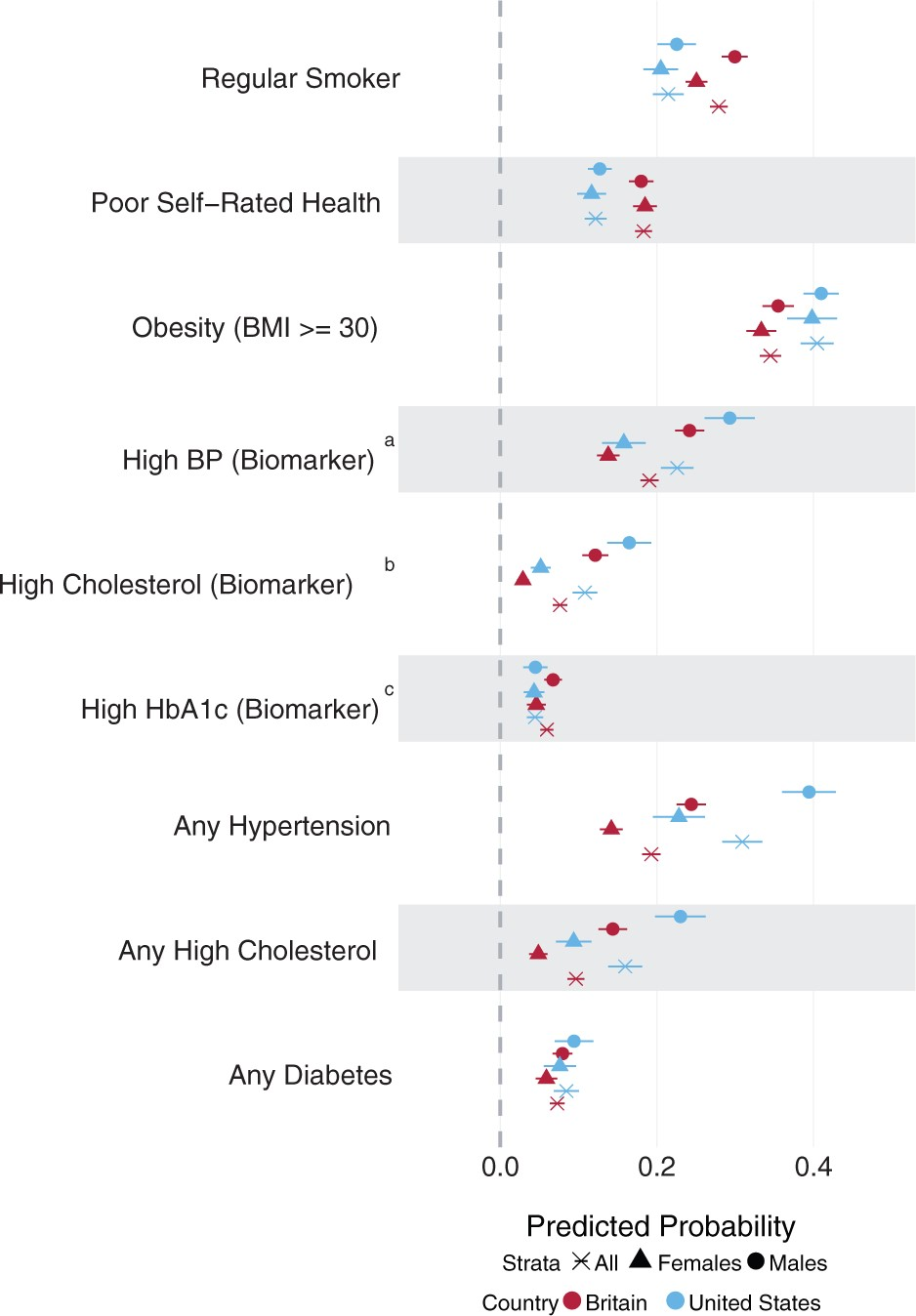A new study shows that in midlife, United States citizens are less healthy than their British counterparts. The latter, however, smoke more and rate their health worse [1].
I’ll show you my health if you show me yours
It is well-known that despite the US being one of the richest countries in the world, it has high disease prevalence and one of the lowest life expectancies in the developed world. America also spends more than almost any other country on healthcare per capita, which does not seem to help.
In a new study, published in the International Journal of Epidemiology, scientists set out to answer the question of who is healthier in midlife: Americans or the British? After all, the two countries have multiple similarities, and neither sports a particularly healthy food culture. The study was done by researchers from Oxford University and University College London, in collaboration with American scientists from the University of Texas and the University of North Carolina.
The researchers analyzed data on about 12,000 Americans and around 10,000 British citizens in their 30s and 40s. The authors note that while there have been studies of health differences between the two countries’ populations, those were mostly done in older people. Middle age, on the other hand, is a crucial point in life when many age-related diseases and conditions start to manifest themselves, and the body’s capacity begins its slow decline.
“Critically,” the researchers write, “international comparisons provide the opportunity to identify contextual drivers of population health.”
Americans are at a disadvantage
The researchers found that Americans are more likely to be obese and have high blood pressure. The US cohort also had higher total cholesterol and a higher total cholesterol-to-HDL cholesterol ratio, which indicates metabolic problems. In general, Americans appeared objectively less healthy, but UK residents were worse-off in terms of self-rated health.
Interestingly, while being healthier overall, people in the UK were more likely to be smokers. This concurs with previous research, which “found the prevalence of risky behaviors, including smoking, to be more common among English adults despite their lower chronic disease risk.” [2] This seeming contradiction, the authors hypothesize, might reflect an interplay of both individual and wider social factors, such as the differences in the two healthcare systems.

In both societies, lesser socioeconomic status was associated with poorer health, although for Americans, the correlation was stronger. “For some outcomes,” the researchers note, “such as hypertension and cholesterol, more socioeconomically advantaged US adults had similar or worse health than socioeconomically disadvantaged British adults.”
Is it the system?
Digging deeper into those differences, the researchers make an interesting observation based on previous research: the US does better than the UK in mortality and morbidity for medically amenable causes of death [3], possibly because Medicare provides universal quality healthcare for older people who bear most of the disease burden. Why is the prevalence of disease still higher in the US and the life expectancy lower? These researchers hypothesize that the lack of universal access to healthcare at younger ages has long-term effects.
Lead author, Dr. Charis Bridger Staatz from UCL’s Centre for Longitudinal Studies, said, “We can speculate that differences in levels of exercise, diets and poverty, and limited access to free health care may be driving worse physical health in the US. Given political and social similarities between the US and Britain, the US acts as a warning of what the state of health could be like in Britain without the safety net of the NHS and a strong welfare system.”
Co-author Professor Jennifer Dowd, Deputy Director of the Leverhulme Centre for Demographic Science and Oxford Population Health’s Demographic Science Unit, added, “Despite the worse health of American compared to British adults in midlife, higher rates of smoking and growing obesity levels in Britain show that there is room for improvement in both countries.”
Our analyses identified a US mid-life health disadvantage similar to that observed at older ages. The health disadvantage is notable for obesity, hypertension and cholesterol, though British adults have greater probabilities of current smoking and worse self-rated health. Further, socioeconomic inequalities are typically wider in the USA, where health differences between the most and least advantaged are larger. For current smoking, and to a lesser extent diabetes, this is due to better health among socioeconomically advantaged US adults but worse health among socioeconomically disadvantaged adults compared with Britain. For hypertension and high cholesterol, socioeconomically advantaged US adults have comparable—or worse—health than socioeconomically disadvantaged British adults.
Literature
[1] Bridger Staatz, C., Gutin, I., Tilstra, A., Gimeno, L., Moltrecht, B., Moreno-Agostino, D., … & Ploubidis, G. B. (2023). Midlife Health in Britain and the US: A comparison of Two Nationally Representative Cohorts. medRxiv, 2023-12.
[2] Zaninotto, P., Head, J., & Steptoe, A. (2020). Behavioural risk factors and healthy life expectancy: evidence from two longitudinal studies of ageing in England and the US. Scientific Reports, 10(1), 6955.
[3] Aron, L., & Woolf, S. H. (Eds.). (2013). US health in international perspective: Shorter lives, poorer health.
View the article at lifespan.io








































